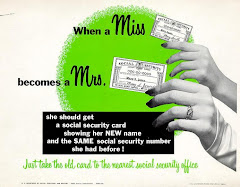April 12, 2010
How long do I have to be married to qualify for wife's benefits?
April 11, 2010
Question from a reader about wife's benefits
Answer: Yes, you can apply for your own retirement now and apply for a wife's benefit when your husband reaches age 66 as long as he files an application with Social Security at that time. It is very possible that your spousal benefit will be higher than your own retirement, but your combined benefit rate will be less than 50% of your husband's unreduced benefit.
Why? Your own retirement will be reduced up to 25% if you take benefits early and the % of this reduction will remain even if you wait until your FRA to apply for the wife's benefit.
The only way to get the full 50% as a wife is to wait until your FRA to apply for both benefits. Even if your husband continues working, he can start to receive his benefits at his FRA or he can choose to suspend his benefits and wait until age 70 to claim his maximum retirement rate.
April 9, 2010
A reader asks about divorced wife's benefits
Answer: You are right to be concerned; this strategy will only work IF your ex-husband is younger than you.
Why? Because you will have to apply for both your retirement and divorced wife's benefits if your ex-husband is age 62 or older when you apply. And both will be permanently reduced if you start receiving benefits before your full retirement age of 66.
The only way you will be allowed to choose between the two is to wait until you reach your full retirement age of 66 to apply. Keep in mind that at that point, there is no advantage to waiting longer to apply as a divorced spouse since you will have already reached your FRA (full retirement age).
But, if you are still working or if you can afford to wait to start your benefits, it may be advantageous to apply for the divorced wife's benefit at 66 and then switch to your own maximum retirement benefit at age 70 (if that is higher).
Will the increase in benefits at age 70 be worth the wait? Request a Personalized Benefit Analysis and I will compute your benefits under each option and compare your lifetime benefits at five year intervals so you can make an informed decision!
March 26, 2010
I am retiring at 62. I read that I can apply for wife's benefits now and wait to apply for my own retirement at 70. Is that true?
Why not? Applying for a spouse's benefit first can preserve your right to claim your own maximum retirement benefit at age 70, but you and your husband have to meet certain requirements under the law to take advantage of this strategy:
- Your husband has to apply and qualify for Social Security benefits before you can qualify for a wife's benefit, AND
- You have to wait until your FRA to apply for the wife's benefit to take advantage of the higher retirement benefit on your own work record at age 70.
Assuming you meet these basic requirements, you should also consider:
- Will you and your husband have enough income from other sources from age 62 through 66 to pay your living expenses and
- Will your age 70 retirement benefit rate will be high enough to make this strategy worthwhile over your expected lifetime?
Whatever you decide, be sure to get the facts before you apply. If you change your mind later, you can withdraw your application but you will have to repay all benefits paid to you before Social Security will approve your request for a "do over."
March 20, 2010
What is the difference between Social Security disability and retirement?
In general, disability benefits are higher than retirement benefits with a few exceptions:
- There is no advantage to applying for disability after your full retirement age (FRA) unless you can qualify for at least one month's benefits before your FRA month.
- If you receive worker's compensation benefits that offset all or part of your Social Security disability AND are at least age 62, you may elect to receive a higher retirement benefit until the worker's compensation payments end.
Can't afford to wait several months to hear whether your medical condition qualifies for disability? If you are between 62 and your FRA, you can apply for a reduced retirement at the same time you apply for disability. Your initial benefit will be less but you will get your retirement each month while you are waiting to hear about your disability claim. If you are approved, Social Security re-figure your benefits to the higher disability rate.
And if you are approved for disability benefits effective with age 63 or earlier, you will qualify for Medicare before age 65. There is a two year waiting period for disability Medicare that begins with the first month you are eligible for a disability payment.
.jpg)





